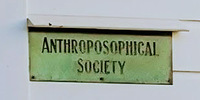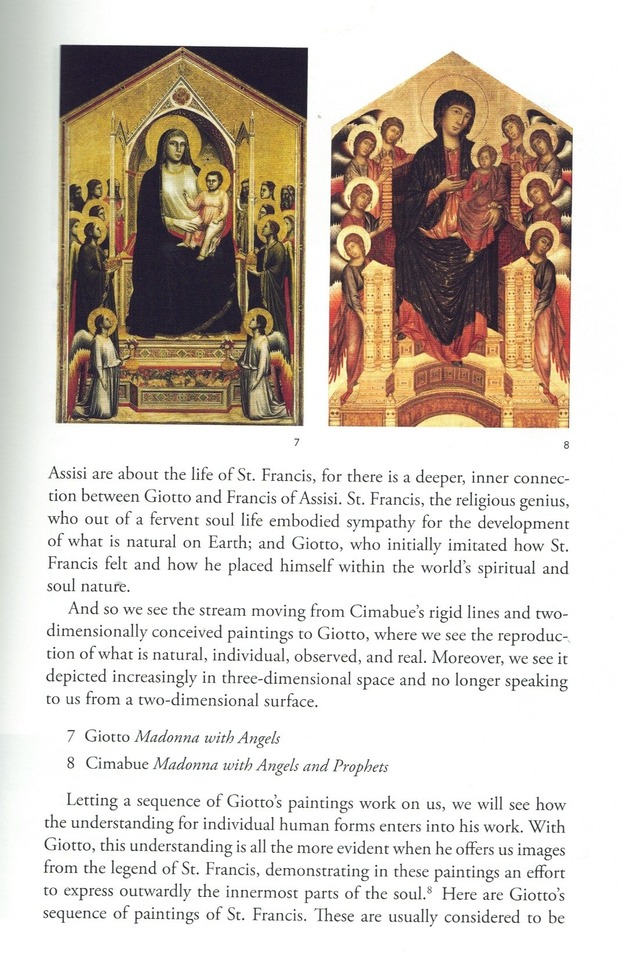Newsletter 34: Sunday 24 August 2025Anthroposophy in Hawkes Bay
|
Book Review
ART HISTORY, a Reflection of Inner Spiritual Impulses
by Rudolf Steiner (CW 292)
Translated by Rory Bradley, Introduction by Keith Sagarin
This book has recently been purchased from Humanity Books and added to the library at the Centre. It contains thirteen lectures on art history given by Rudolf Steiner in 1916 - 1917, interspersed with 800 colour and black and white images of the artworks that are mentioned.
“What had been revealed to me through spiritual perception as the law of human evolution appeared in clear manifestation before my mind in the development of art.” *
Having given lectures on human evolution, Rudolf Steiner focused these art history lectures on Southern and Northern European paintings and sculptures, mainly from the times of Cimabue and Giotto (13th and 14th centuries, respectively) through the renaissance years. Also included are images and notes about early art works from Greece, early Christian mosaics and Russian icons.
Although you will probably not be able to read this page with two images, I have included it to illustrate an example of the presentation in this very special and inspiring book.
(Larger images of the art works in Art History can be viewed on www.steinerbooks.org/research/arthostory.aspx )
Thank you Fran, as the Centre’s librarian, for acquiring this book.
*Rudolf Steiner, Course of My Life.
Diana
~~~~~~~~~~~~~~~~~~~~~~~~~~~~~~~~~~~~~~~~~
BRANCH TRUSTEES
Michael Lawn, as a Trustee, introduces himself:
"I was born in Whakatane in the Eastern Bay of Plenty in 1966 as the eldest of five children. We grew up on a dairy and sheep farm inland from Whakatane , towards the Ureweras. My mother was a primary school teacher. I was not interested in farming then, but I was interested in what happened to the produce that went off farms so after high school I went to Massey University in Palmerston North and did a degree in Food & Biological Materials Processing & Engineering. Then another year doing a Diploma in Dairy Science & Technology. I then spent the next seven years working in the dairy industry in various roles including seasonal shift work – I certainly experienced what rotating shift work can do to the body.
In my late twenties I felt the need for a change, but I wasn’t sure what – so I woofed (Working On Organic Farms) around Northland and encountered permaculture, organic and biodynamics. In 1998 I came down to Hawkes Bay to do the Biodynamics course at Taruna College with Peter Proctor and Raechel Pomeroy. The one year diploma course for teachers was also running with Robin Bacchus as co-ordinator. It was a stimulating time with all the students, many from overseas, travelling speakers, workshops and so on. Hans Mulder was also a tutor on the course and with his knowledge, events at the centre and access to the Tauna and centre libraries I also met the knowledge behind biodynamics - anthroposophy.
I joined the Society a year or so later. I also started initially working part time at Humanity Books & Fine Arts and never left. For over 20 years I lived in the cottage on Alan & Kay Keats property where I gardened and with Kay & Alan put 500 on most springs and autumns.
I am one of three trustees on the Branch Trust with Andrew McGovern & Jenny Speedy. I am in my second three-year term. I see the role of our trust to act as legal guardians for the centre property and its funds. The trustees also consider funding for purposes that further anthroposophical life in Hawkes Bay & NZ."
~~~~~~
SEMINAR REPORT
Recently, British economist and anthroposophist Christopher Houghton Budd held a Seminar for the Anthroposophical Society members in Auckland on the topic "Made in Aotearoa". Angela Hair and Susan Wotherspoon from Hawke's Bay attended. Angela has written a report which you can read here.
~~~~~~
Items, Notices, Letters, or articles of interest to the Hawkes Bay Anthroposophical community
ARE MOST WELCOME
Please email your text by midday Saturday to the Editor at info@anthrohb.nz with"For AnthroHB News" in the subject line.
Diagrams and pictures need to be in .jpeg or .jpg format.
Robin Bacchus, Editor
Who owns the Centre?
No-one – that is no “one” - owns the Centre. But group of people, organised as a Society, do. That Society is “The Hawke's Bay Branch of the Anthroposophical Society in New Zealand.” It was first formed in the late 1970s in order to purchase an ex-corner dairy on 500 Nelson Street North, (opposite the Rudolf Steiner School), as a home for anthroposophical activities in Hawkes Bay. A member, Dora Bird, had left a sizeable bequest to the Society for the purpose of purchasing a property. Prior to that, members of the Society met in rooms in the school (which was busy growing with a new High School) and in the home of Ruth Nelson and Edna Burbury, Taruna, in Havelock North. They died in the late 1970s.
Over the next decade, the building was renovated: the dairy shop was removed; interior walls were removed so that 4 rooms and a passageway became the large main room – the ceiling being kept up by a long steel beam.
In the late 1980s, a house on the school property (no longer needed) was moved from 310 Fitzroy Avenue and nestled in behind the original building and the two were joined by the present Foyer.
In 1990 (35 years ago), the Society was incorporated under the Charitable Trust Act 1957. https://www.legislation.govt.nz/act/public/1957/0018/latest/whole.html
Key clauses in this Act are:
Clause 38 (f) the support of libraries, reading rooms, lectures, and classes for instruction.
Clause 39 … in which money has been raised for any charitable purpose by way of voluntary contribution, or by the sale of goods voluntarily contributed, or as the price of admission to any entertainment, or in any other manner of voluntary contribution …
....
In the founding Trust Deed, three Elected Trustees are empowered to buy or sell real property for the Society. An executive Committee of up to 7 people have the task of managing the affairs of the Society and maintaining the buildings.
Another aspect of being a Charitable Trust is in relation to tax: The Society’s financial transactions are not taxed and donors to the Society can claim a tax credit. IRD says:
- About donation tax credits
Individuals can claim 1/3rd of the value of eligible donations over $5, up to their taxable income. - Getting the right receipt for your donation
To claim donation tax credits, you have 4 years to submit receipts from an approved organisation that clearly show all required information.
(The Treasurer of the Society sends an official receipt for tax purposes to all donors soon after the end of the Financial year on 31 March,)
--------------------------------------------------
The Society adopted a new set of Rules (also called a Trust Deed or Constitution) in April 2008. The Objects and Purposes are outlined there as follows:
"The Branch Society's objectives are expressed in the Principles given by Rudolf Steiner at the founding of the General Anthroposophical Society at Christmas, 1923.
The Branch Society is intended to be a community of human beings who desire to further the life of the soul - both in the individual and in human society - on the basis of a true knowledge of the spiritual world. This is to be attained not only by studying the works of spiritual science but also by fostering educational opportunities for those people in all walks of life who seek answers to contemporary issues out of a renewal of human culture. It is a purpose of the Branch Society to cultivate Anthroposophy through artistic, scientific and educational activities (in the broadest sense of these concepts) and the Branch Society intends to devote all reasonable means available to realise this purpose. This shall include the appropriate supporting of libraries and providing of lectures and publications."
----------------------------------------------------
Over time things change.
- At that time communication with members of the Society was by letter to a Postal Address; now it is predominately by email and virtually all members [except 5] have an email address.
- At that time payments were made with cash and cheque; since then cheques have vanished and cash is rarely used for larger payments – most payments now are by ETFPOS (Electronic Transfer of Funds at Point Of Sale) or Digital Wallets.
- With the Internet, many transactions are not face-to-face or confirmed with a handshake but are remote and very quick. However fraud and scams are frequent and challenging. So, in recent months all NZ banks have adopted a policy of Confirmation of Payee [CoP] for all digital payments.
This is wonderful, but also raises a problem. As you may be aware the official owner’s name on our bank accounts is the registered name of the Society, which is over 60 characters long: “The Hawke's Bay Branch of the Anthroposophical Society in New Zealand”. This length is very tedious to type, though one can also ‘copy and paste’ of course. But it seems it is too long for some banks apps – even though Kiwibank has accepted its length as an actual name.
This has led the Committee to consider revising the Rules and adopting a much shorter name. But this is lawyer territory. Rules are written in ‘legalese’ which is a foreign language using English words.
To Change the Rules we must hold a Special General Meeting for that purpose. We are tagging the date, Saturday 8th November, for this while we work through any other changes that may be called for by changing circumstances. The proposed changes are highlighted in this version.
We are wondering if any of our readers are lawyers or are versed in sorting legal problems?
If you can help, please give Robin a call on 022-3982805.
RB
Posted: Sat 23 Aug 2025
| © Copyright 2026 Anthroposophy in Hawkes Bay | Site map | Website World - Website Builder NZ |


